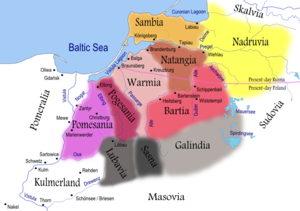Battle of Krücken
| Battle of Krücken | |||||||
|---|---|---|---|---|---|---|---|
| Part of the Prussian Crusades | |||||||
 Prussian tribes in the 13th century | |||||||
| |||||||
| Belligerents | |||||||
| Prussians (Natangians) | Teutonic Order | ||||||
| Commanders and leaders | |||||||
| Unknown | Marshal Heinrich Botel | ||||||
| Casualties and losses | |||||||
| Unknown | 54 knights & many lower-rank soldiers killed | ||||||
The Battle of Krücken was a medieval battle fought in 1249 during the Prussian Crusades between the Teutonic Order and Prussians, one of the Baltic tribes. In terms of knights killed, it was the fourth largest defeat of the Teutonic Knights in the 13th century.[1]
Marshal Heinrich Botel gathered men from Kulm, Elbing, and Balga for an expeditionary attack deeper into Prussia. They traveled into the lands of the Natangians and pillaged the region. On their way back, they were in turn attacked by an army of Natangians. The knights retreated to the nearby village of Krücken south of Kreuzburg (now Kamenka south of Slavskoye),[2] where Prussians hesitated to attack. The Prussian army was growing as fresh troops arrived from more distant territories, and the Order did not have enough supplies to withstand a siege.[3] Therefore, the Teutonic Order bargained for surrender: the marshal and three other knights were to remain as hostages while the others were to lay down their weapons.
The Natangians broke the agreement and massacred 54 knights and a number of their followers. Some knights were executed in religious ceremonies or tortured to death. The severed head of Johann, vice-komtur of Balga, was mockingly displayed on a spear.[4] Others were ransomed or exchanged, including Marshal Botel. Such barbarity gave the Teutonic Order an excuse not to treat the Prussians as civilized and honorable people. Never again did the knights surrender to pagans.[3] The Natangians did not exploit their victory and did not make offensive moves into the lands of the Teutonic Order. It took two years for the crusading military order to recover and avenge the massacre.
References[edit]
- ^ Baranauskas, Tomas (22 September 2006). "Ar priminsime Europai apie Šiaulių mūšį?" (in Lithuanian). Delfi.lt. Retrieved 9 May 2007.
- ^ Pėteraitis, Vilius (2003). "Kriukai". Mažosios Lietuvos enciklopedija (in Lithuanian). Vol. 2. Vilnius: Mokslo ir enciklopedijų leidybos institutas. p. 332. ISBN 5-420-01470-X.
- ^ a b Urban, William (2000). The Prussian Crusade (2nd ed.). Chicago, Illinois: Lithuanian Research and Studies Center. pp. 241–42. ISBN 0-929700-28-7.
- ^ Jeroschin, Nicolaus von (2011). Mary Fischer (ed.). The chronicle of Prussia : a history of the Teutonic Knights in Prussia, 1190-1331. Crusade Texts in Translation. Ashgate Publishing. pp. 117–118. ISBN 978-0-7546-5309-7.
